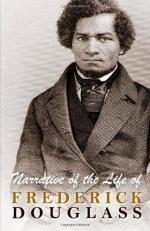A thrill of horror flashed through every soul upon the plantation, excepting Mr. Gore. He alone seemed cool and collected. He was asked by Colonel Lloyd and my old master, why he resorted to this extraordinary expedient. His reply was, (as well as I can remember,) that Demby had become unmanageable. He was setting a dangerous example to the other slaves,—one which, if suffered to pass without some such demonstration on his part, would finally lead to the total subversion of all rule and order upon the plantation. He argued that if one slave refused to be corrected, and escaped with his life, the other slaves would soon copy the example; the result of which would be, the freedom of the slaves, and the enslavement of the whites. Mr. Gore’s defence was satisfactory. He was continued in his station as overseer upon the home plantation. His fame as an overseer went abroad. His horrid crime was not even submitted to judicial investigation. It was committed in the presence of slaves, and they of course could neither institute a suit, nor testify against him; and thus the guilty perpetrator of one of the bloodiest and most foul murders goes unwhipped of justice, and uncensured by the community in which he lives. Mr. Gore lived in St. Michael’s, Talbot county, Maryland, when I left there; and if he is still alive, he very probably lives there now; and if so, he is now, as he was then, as highly esteemed and as much respected as though his guilty soul had not been stained with his brother’s blood.
I speak advisedly when I say this,—that killing a slave, or any colored person, in Talbot county, Maryland, is not treated as a crime, either by the courts or the community. Mr. Thomas Lanman, of St. Michael’s, killed two slaves, one of whom he killed with a hatchet, by knocking his brains out. He used to boast of the commission of the awful and bloody deed. I have heard him do so laughingly, saying, among other things, that he was the only benefactor of his country in the company, and that when others would do as much as he had done, we should be relieved of “the d——d niggers.”
The wife of Mr. Giles Hicks, living but a short distance from where I used to live, murdered my wife’s cousin, a young girl between fifteen and sixteen years of age, mangling her person in the most horrible manner, breaking her nose and breastbone with a stick, so that the poor girl expired in a few hours afterward. She was immediately buried, but had not been in her untimely grave but a few hours before she was taken up and examined by the coroner, who decided that she had come to her death by severe beating. The offence for which this girl was thus murdered was this:—She had been set that night to mind Mrs. Hicks’s baby, and during the night she fell asleep, and the baby cried. She, having lost her rest for several nights previous, did not hear the crying. They were both in the room with Mrs. Hicks. Mrs. Hicks, finding the girl slow to move, jumped from her bed, seized an oak stick of




